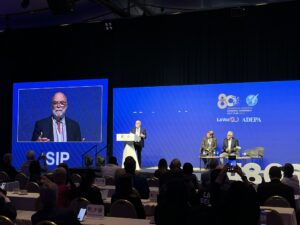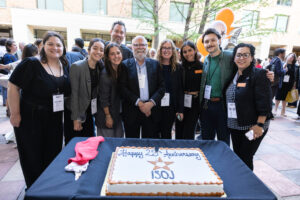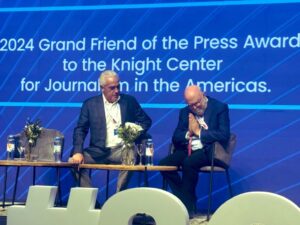Recognizing its “significant contribution to the growth and advancement of journalism and the media industry across the Americas,” the Inter American Press Association (IAPA) honored the Knight Center for Journalism in the Americas on Oct. 17, giving it the 2024 Great Friend of the Press award. The ceremony took place during the 80th IAPA General Assembly, in Córdoba, Argentina.
Upon receiving the award on behalf of the Knight Center, its director and founder, Rosental Calmon Alves, described the center he founded in 2002 as “a dream come true.”

Rosental Alves accepts the 2024 Great Friend of the Press award from the Inter American Press Association. (Photo courtesy of IAPA)
Alves recalled that when he left Brazil in 1996 to take the Knight Chair in Journalism, and later the UNESCO Chair in Communication, at the School of Journalism and Media at the Moody College of Communication at the University of Texas at Austin, he felt inspired to strengthen journalism throughout the region.
“I thought one of my missions there was how I could help my colleagues, my fellow journalists in Latin America, and I started doing it. The first thing I did was start going to the Inter-American Press Association,” he said in an acceptance speech.
Alves said that the Knight Center, “with the extremely generous support of the Knight Foundation,” tries to support journalism mainly in Latin America and the Caribbean through various programs, such as its online course program. He said that, several decades ago when he realized the potential of digital technologies, he also saw an opportunity:
“We understood that we could use digital technology to teach journalists how to use it,” Alves said. “This is how our online course program was born in 2003, and from 2003 to 2012, we managed to reach around 9,000 journalists in Latin America and the Caribbean.”
In 2012, with the popularization of massive open online courses (MOOCs), the Knight Center significantly expanded its reach, and in the last 12 years, it has reached more than 325,000 students – most of them journalists, although the courses are open to everyone .
Alves mentioned that, next week, the program will start a new course, available in English, Portuguese and Spanish, focused on the phenomenon of digital influencers. “We will discuss what influencers can learn from journalists and vice versa. This course will be carried out in partnership with UNESCO,” he said.
Alves also highlighted the ongoing collaboration with UNESCO on other projects.
“We developed a specific course for judges, which has already been taken by more than 12,000 judges and judicial workers over seven years,” he said.
Another pillar of the Knight Center's work is the LatAm Journalism Review (LJR), the only publication in Latin America to cover the journalism industry in three languages (English, Spanish and Portuguese). “It’s a free publication, and I recommend that everyone read it,” Alves said.
Alves also spoke about the importance of conferences organized by the Knight Center, such as the International Symposium on Online Journalism (ISOJ), which celebrated its 25th anniversary this year. “In 1999, we still needed to explain to people what the Internet was. Today, we have a collection of all years available online at isoj.org,” he said.
Alves announced that the next conference will be held in March, with simultaneous translation to Spanish, followed by the Ibero-American Colloquium on Digital Journalism, an event that takes place in Spanish and “portuñol,” “an important language,” he joked.

The Knight Center team celebrated 25 years of ISOJ in April 2024. (Patricia Lim/Knight Center)
Alves also highlighted the role of the Knight Center in the creation of organizations of journalists in Latin America, such as the Brazilian Association of Investigative Journalism (Abraji), the Argentine Journalism Forum (Fopea), Consejo de Redacción, in Colombia, and the Forum of Paraguayan Journalists (Fopep), among others.
In an interview with LJR, Knight Center Associate Director Summer Harlow highlighted the organization's overall impact and mission.
“This recognition is not just an incredible honor for the Knight Center, but it's a testament to the efforts of so many people who have contributed to our mission,” she said.
Harlow also said the award recognizes the concrete transformations brought about by the Knight Center.
“This award recognizes the real-world impact of our work. It honors all the journalists investigating corruption, navigating profound digital transformations, and fighting disinformation—often in the face of threats and persecution,” she said.
The Knight Center’s commitment, she said, remains firm.
“Since 2002, the Knight Center has been at the forefront of all the changes, challenges, and opportunities brought on by the emergence of digital technologies,” Harlow said. “And we will continue to lead the way, providing the training, resources, and support that journalists and communicators need to thrive in this ever-evolving media landscape.”
‘World standard of enormous quality’
The award was given to Alves by the current president of the IAPA, Roberto Rock, who said that, with its various programs, including the LatAm Journalism Review, the Knight Center “benefited thousands of journalists around the world.” Rock gave special attention to the center's current training programs.

The IAPA recognized the work of the Knight Center for journalism and media. (Photo courtesy of Rosental Alves)
“From my point of view, they have a world standard of enormous quality,” Rock said, presenting Alves. “They are attentive to global trends and manage to bring in experts to share their knowledge and experience in dynamic, joyful, instructive and generous seminars. In addition, they are the most economically accessible seminars on the market.”
Rock detailed Alves’ extensive professional career, which began when he was very young, covering security topics at the age of 16 in Rio de Janeiro, his hometown.
With a career that spanned 27 years in Brazil, Alves was one of the pioneers in digital journalism in the country. In 1995, he launched the first edition of a Brazilian newspaper on the internet, JB Online. It was a milestone that anticipated the technological transformations that would come next.
Rock said that in 1987, Alves was the first Brazilian to be awarded a fellowship from the Nieman Foundation for Journalism at Harvard University, in Cambridge.
“He first heard the words ‘digital revolution’ and had an epiphany: He knew this would be the way of the future,” Rock said. “That vision has been shared with legions of journalists in America and other parts of the world.”
Rock said that, for decades, Alves has encouraged the digital transformation of media outlets, warning industry leaders about their structural changes.
“At the core of this evangelizing work, there is a very important political trajectory,” Rock said.
At the end, Rock mentioned Alves' contribution to important investigative projects, such as the research on murdered journalists in Brazil, which analyzed victims of violence against the press on a case-by-case basis.
Finally, Rock thanked Rosental's family, especially his wife, Claudia, and his four children, who supported him throughout his professional career.
“He is a workaholic and I think that, even when he rests, he works. A round of applause for Rosental, a great friend of the press," Rock said.
Optimistic but anxious in the face of the future
After Alves accepted the award, there was a conversation between himself, Rock and José Roberto Dutriz, vice-president of the IAPA.
Alves emphasized the importance of embracing innovation so the profession remains relevant.
“I am optimistic about the future, despite all the problems and radical changes we are seeing. Journalism has always existed in any formation of human society, since the time of the caves," Alve said.
Alves added that although journalism as we know it today is around 150 to 200 years old, there are no guarantees that it will continue like this for another 200 years. “Therefore, we must embrace innovation and entrepreneurship. Do not reject innovations," he said.

Rosental Alves created the Knight Center for Journalism in the Americas in 2002. (Photo courtesy of Gabriela Vivanco)
Alves admitted to being anxious in the face of rapid changes, especially due to the uncertainties surrounding the impact of artificial intelligence in the journalistic field.
"I feel a little distressed about this change because I don't have the same comfort I had when I experienced that epiphany in 1987-88, knowing what was coming. Artificial intelligence presents enormous opportunities and challenges, and it is going to change everything," he said. "The lesson we must learn in the face of artificial intelligence is not to repeat the same mistake of not understanding the magnitude of this revolution."
Alves also addressed misinformation and highlighted that journalism needs to face this challenge with new transparency and public engagement strategies.
“We see a global movement to destroy democracy that begins by demoralizing the press as the first link,” Alves said, emphasizing that the recovery of credibility is fundamental for the survival of the press.
Alves recommended the adoption of new transparency techniques to explain to the public how journalism works, since the information monopoly no longer exists.
"Before, it was not necessary to explain how we worked; it was assumed that we had a monopoly on journalism. Today, we don't even have a monopoly on information," he said.
Alves concluded by saying that journalism will continue to exist, but in a different way and adapted to new technologies.
"There is no human society without a storyteller. Maybe it is different, maybe we have artificial intelligence agents with whom we will interact differently, but journalism will still exist,” he said. “Unless there is a Big Brother or a dystopian future that prohibits it.”